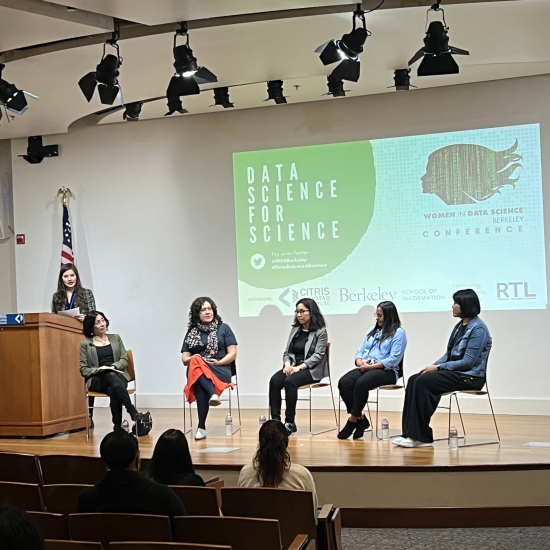By Rachel Leven
When Joyce Shen began teaching data science at UC Berkeley nearly a decade ago, she noticed a problem she’d also seen in industry. There were barely any women.
The nascent data science field that would forever change how we live was being primarily developed by men, creating products that would shape society for decades. Today, due to intensive Berkeley recruitment efforts, she has seen the numbers in her classes change.
“We have much more representation of students from all walks of life, including more women,” said Shen, a School of Information continuing lecturer and an investor focused on data and AI companies, at the Women in Data Science, Berkeley conference on March 7. That’s had an impact, she said. “Our discussions are much richer when we talk about ethics, when we talk about data quality.”
More than one-third of recent Berkeley Master of Information and Data Science students and nearly half of Berkeley students who graduated with a bachelor’s degree in data science last year were women. The same isn’t true in the field. Men hold three-quarters of technology companies’ leadership roles. This lack of diversity can result in biased data, algorithms and products that hurt the public.
“We should always be looking at who is not at the table and how we can create an environment that brings them to the table,” said Jennifer Chayes, associate provost for Berkeley’s Division of Computing, Data Science, and Society. “The implications of data science and AI are permeating everything we do, and if it’s only represented by a certain group of people, we're going to have some of the problems that we are seeing in this world.”
Chayes and Shen spoke on a panel at the annual event, which spotlights female data scientists’ work and journeys, during Women’s History Month. CITRIS and the Banatao Institute, Computing, Data Science, and Society, Berkeley Research, Teaching, and Learning, and the School of Information sponsored the event.
Advice for future data scientists
Chayes, who is also the School of Information dean, said that “you’re assured a job” if you are good at data science. Experts at the conference offered a number of ways to help young women get started and grow in the field.
Chayes and other panelists encouraged young people to find and be mentors. They suggested routinely attending workshops for subjects they’re interested in within or outside of their job scope, sharing about your work on Medium, and becoming a strong active listener.
“The number one thing that sets people apart is their ability to connect with other people,” said Kira Wetzel, an analytics engineering manager at Meta, about potential job candidates. “Really listen to what the other person is saying and show interest in that.”
Young data scientists should also identify their “superpower,” or what unique strengths they have and can use “for good and for impact at work,” Shen said. That superpower could be a technical skill, but it could also be using your privilege that brought you into an exclusive space to invite others in behind you, said Sarah Luger, an Orange Silicon Valley principal.
Some panelists said they felt out of place at some point in their careers, whether that was because they were the only woman in a meeting or they felt unprepared for their role. Manjula Mishra, a Radian, Inc. senior data scientist, urged women to ask their questions aloud.
“Especially as women, we carry that guilt that we have to know everything, [but] not everybody knows everything,” Mishra said. “I have realized that if I approach somebody – even professors or somebody well-established in the industry – most times if you have genuine questions and genuine things to share, they respond.”
Originally published on March 14, 2023, as “Look for ‘who’s not at the table’ and other advice from female data scientists” by Computing, Data Science, and Society.










